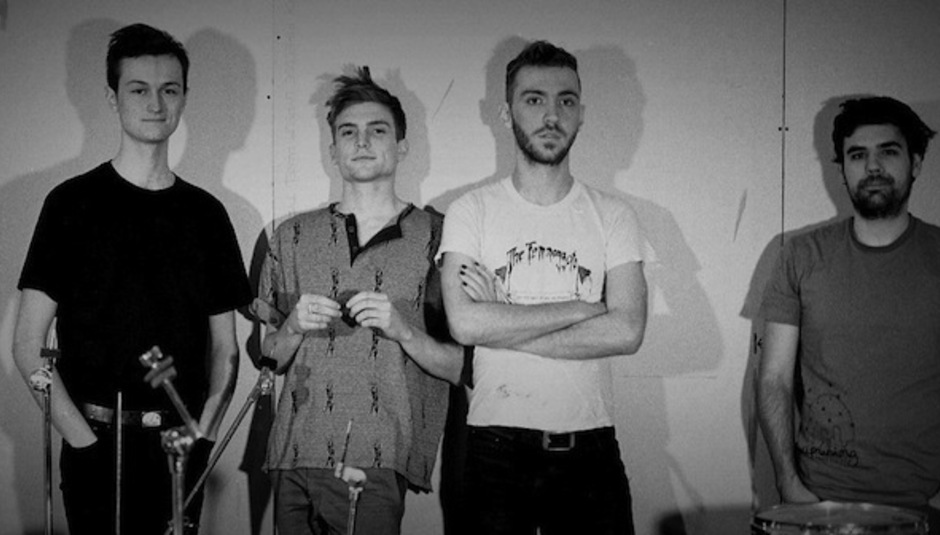“I retain the right to be disgusted by life, I retain the right to be in love with everything in sight”. This year, Ought’s debut album More Than Any Other Day perfectly summarised, with a raw guttural scream, the competing feelings of exhilaration and frustration of life in the 21st century.
Since forming somewhat fortuitously amidst the Quebec student protests in 2012, Ought have stood out as a band that has chosen to look the world, in all its beauty and horror, straight in the eye. Rather than adding another suffocating layer to the current zeitgeist for chloroformed electro that's destined to soundtrack another make-out scene in Made In Chelsea, the band instead have shaken unwitting listeners awake with a lacerating larynx of home truths and galvanised guitars.
In 46 minutes, More Than Any Other Day manically explores the contradictions of everyday life to a frenzied beat: the exhilarating highs, the suffocating depressions, the sense of being together but alone, being important but still a number, the sublime and mundane occurrences. Although the band have suffered the usual accusations of being derivative (see: Modern Lovers, Talking Heads, Television) their narrative is and continues to be firmly rooted in the modern age.
We caught up with Ought’s drummer Tim Keen, a man that speaks at all times in an undiluted, charged pace, to find out about the dark experiences that informed More Than Any Other Day, what it’s like to play in a truly democratic band, and why Ought are no Modern Lovers...
You formed at McGill University in Canada. What drew you together as people and then a band?
Tim Beeler and I were in the same orientation group at McGill, so we bonded through this insane bro’ey orientation where everyone was chugging beers and we were standing there looking very bemused. I think there were just mutual friends that brought us together; we went to all similar shows and were in the same circle.
When you started you hung out at the Brasserie Beaubien bar. How did it shape you as a band? How important was it to you to be a part of that community?
Let me explain it to you a little bit, so it’s just this tiny little bar that’s about a block from our house where there’s like all kinds of shows – community run, like locally booked shows – really weird and interesting stuff. For me it was really pivotal, it allowed us to get up quite a few times in front of our friends and to be put on with really interesting bands that I would have never had met or got to know if it wasn’t for those shows.
It really made us push what we were doing. In Montreal, especially in that little scene, you’re rewarded for doing things that are kind of out there or unusual or challenging for your audiences. You’re not necessarily rewarded in the same way for doing something that’s conventionally ‘cool’.
I think that was really effective for me, looking at the kind of music I wanted to be playing and trying to get a little more interesting and weird. Starting to think more outside of the box and trying to make music that my friends would enjoy …For the most part, we knew who was going to be at those shows and we wanted to make music that they would be into and that they would appreciate.
What kind of music did you want to make when you first set out?
Some of the songs on the record are from when we played our first shows. We haven’t really evolved in public as much as we have evolved in private; we have really long jam sessions where we pluck ideas out of them, out of two hour jams it’ll become really clear that a 10 minute segment is interesting, we’ll take that segment and work on it really hard.
We came out of the gate with an idea of what we were doing, but not a conscious idea. We were doing the same thing and we just became a lot better at our instruments and articulating it over the time we were doing it.
You get compared a lot to artists like Richard Hell, Jonathan Richmond And The Modern Lovers and Television. Would you say they’re influences? How do these comparisons sit with you?
Those bands are my influences in a sense that they were major touchstones when I was growing-up - it’s kind of hard to avoid. Like anyone who was kind of nerdy at a particular time I listened to the Modern Lovers a lot and I really like Jonathan Richman and all of that stuff; it’s not necessarily the music I’m putting on when I’m going home each day, I mostly listen to my friend’s bands or local music or stuff that’s a little more contemporary.
We all listened to that stuff and internalised it a little deeply, but I’m not thinking about that when I’m making music…I think we talk more in our jams about how we want it to feel like or how we’re feeling when we’re making music.
The band seems very democratic, you normally try to do interviews as a group and your Facebook page says “everyone’s in the band”. Where did that originate from?
I think the cool thing about that is that it really allows very specific and distinct personalities of musicians to manifest. Like, everyone in the band has very definite idiosyncrasies and we can kinda learn from them rather than fight.
I was trained as a classical musician so I have a lot of experience of coming into a situation and playing in a way that I’m told to play and trying to capture a particular thing. That became, at some point in my life, very tiring and boring and I didn’t really feel I was articulating who I was as a musician.
To come into practice and play in a way that I like to play and that I’m interested in and to have the other players around me who do that as well….the good parts are the parts when that connects together, rather than the good parts being when one person is convinced that the other three people are doing something that sounds good.
It’s a lot harder, it takes us a really long time to write songs but I think the product to me is more interesting.
It seems to more of a punk rock way to go about it - doing it together - rather than there being any sort of hierarchy.
For sure, I would be hesitant to read any ideology into it but thinking about the things we were thinking about at the time and are still thinking about and trying to be more democratic in the way that we live our everyday lives, I think it would be weird for us to talk about those ideas and then come into a band and have one person order us around.
You came together as a band during the student strikes over the Quebec’s government’s plans to increase tuition fees. Do you think the strikes had a direct impact on you as a band?
It’s not a hugely immediate thing, but it was a really nice analogy for what was going on in our heads at the time. The city was kind of going through this whole period of really dramatic unrest where people were beginning to reconsider these fundamental things; it wasn’t the strike was so much about ‘we want to do this particular thing through parliament’ it was like ‘how should education be funded? What is the important of education? What can we achieve if we all work together?’
I’d just graduated and had moved rom Australia to Montreal with very little idea of what I was doing with my life and that kind of situation makes you start thinking about institutions and your own institutions, like “what do I really want to? Or why am I doing this thing? That ‘why’ is more fundamental that ‘what career do I want?’ You get up everyday and go to buy groceries or whatever and you’re like, ‘why do I buy this?’
I think we were all going through this weird period of really unsettled thinking and that was paralleled in the whole city at the time and that amplified everything and made it easy to have conversations. You’d just walk in and sit down and have a fairly in-depth conversation considering a fundamental thing about yourself; that was so normal at the time, it was so regular, it was the way everyone was acting, it was really exciting.
The album does seems to me to be about when you first leave university and you’re trying to figure out your place in the world and where you fit after being technically institutionalised for years.
Absolutely and it’s way easier to be distracted than think about something. We shouldn’t not give people credit for going about their daily lives; daily life is fucking hard there’s a million things to think about and it’s not easy or necessarily profitable to be sitting there and fundamentally reconsidering things all the time.
Sometimes I think people need to realise it’s ok or that they can reconsider things or rethink things and sometimes I think the only way, the easiest way, is to have a lot of people do it at the same time. If you’re the only person being like, ‘what’s going on here?’ And everyone else is totally normal you start to feel weird about it or you question yourself or you start to think you’re wrong for thinking that.
The record, if you take it on surface value, has so much tension and it could be seen as quite dark. However, there are so many positive themes in there. What was your outlook at the time?
I don’t think it was intentional, like no on ever sat down and had a master plan for this record it just kind of was what, especially with the lyrics, what Jim was thinking about at the time and what we were all thinking about.
It was this period of time where it was dark …it’s hard to be sure what has actually changed after the strike or after any big event; I think some things are scary like systems being very solid and unchanging it’s easy to feel hopeless, but on the flip-side of that there’s the possibility to do small things or be different in certain ways and that’s liberating.
A lot of the record I think is built around feeling simultaneously disappointed and excited. It would be weird to be totally positive, it would seem odd to be totally positive given the world and it would seem incongruous with the way people are actually living. We were talking about this the other day that maybe being tongue in cheek, a little bit dark or a little bit sarcastic, it gives more access to truth or feeling something than just being straight up positive about it.
It’s nice to hear a record with some positivity as sometimes it’s braver to be positive and see the better side of something than bleak. The lyrics like ‘we’re all the same’ is such an comforting message.
Absolutely, it’s just trying to find a way of being in a world that doesn’t feel didactic or too one-sided, it can go either way, if you put on a record and it goes ‘everything is good! Be positive!” It’s still authoritarian in that weird way and feels strange and freaky. I don’t think any of us feel like we know anything well enough to preach about it, it’s really just a record of our experiences.
When you said there were dark experience during that time, what informed that?
There’s no particular real darkness, maybe coming out of institutions and seeing what the reality is, like “oh shit, this thing I think is solving the problem isn’t actually solving the problem.” Or realising they thought they had grand solutions to things and nobody did. Just reconsidering people’s place and value in the world and how important their actions might be, not that people’s actions aren’t important, I think it’s maybe more about how actions are more important on a very small level.
When you’re in school and you’re talking about ideas you think your actions are really important in a huge ideological way. I saw a lot of people get really sad when they realised that that wasn’t the case. It was a confusing time as we were working various not great jobs and figuring out how to keep doing music and living in the city. I wouldn’t ever suggest our sadness was more dramatic, it was more regular stuff.
I think it’s relatable as it’s becoming the norm for people in their twenties, up against high unemployment, to struggle to get even an unpaid internship let alone a job.
That feeling of having the rug pulled out from under you, not that we didn’t know it. I feel like people in school here knew that that was going to happen but it’s a whole different thing when it happens. It’s not even just young people, it happens to everyone.
You found the cover art of the album in a dumpster. How did you come across it?
Our friend Maya actually found that photo, it’s part of a whole series of photos that she found in dumpsters in Montreal. We had a larger version of this photo hanging up in our kitchen for a really long time and if you look at the whole photo it’s bizarre.
It’s like 70s/80s, you know? When people went on these corporate team retreats or team building exercises and everyone has their hands in and they’re clearing thinking about some task or whatever and they look really sad; if you can see their eyes they look deeply sad and look like they’re wondering when they get to go home. They all look like people who would never talk to each other if they weren’t forced into this situation.
I remember looking at this picture everyday when I was washing dishes, we weren’t really thinking about what it meant, I just looked at it all the time and when it came to the art for the record it seemed to make a lot of sense: simultaneously the feeling of working together and that total alienation.
You’re signed to Constellation Records. What drew up to them as a label? What’s your relationship like with them?
It’s pretty unreal they take amazing care of us. Every day it’s becoming clearer to us in the band how little we know about putting out a record and touring it and they know everything and have done it a thousand times before. With us it’s total care and respect…we’re really lucky to work with a label that’s so interested in us and purely interested in music. They really just care about us making a good record and anything after that is a bonus.
When are you going to start the second album?
Oh my god, sometime next year. We’re playing a couple of new songs on this tour and the theory is we start working on stuff in our breaks and hopefully by sometime next year we should have the next album or should be thinking about the next album. Who knows, we’ll see.
More Than Any Other Day is out now.























